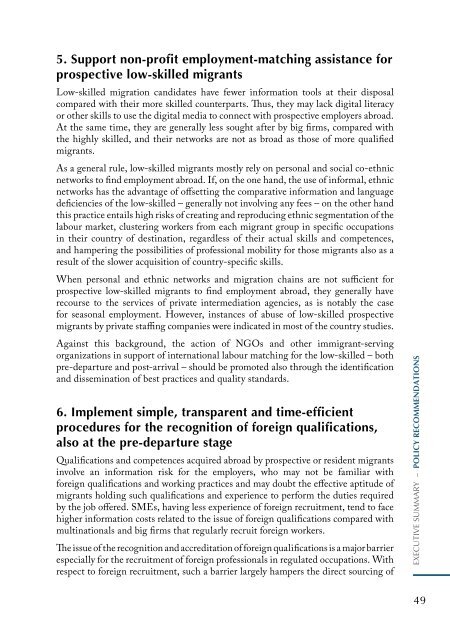International Organization for Migration (IOM)
International Organization for Migration (IOM)
International Organization for Migration (IOM)
Create successful ePaper yourself
Turn your PDF publications into a flip-book with our unique Google optimized e-Paper software.
5. Support non-profit employment-matching assistance <strong>for</strong><br />
prospective low-skilled migrants<br />
Low-skilled migration candidates have fewer in<strong>for</strong>mation tools at their disposal<br />
compared with their more skilled counterparts. Thus, they may lack digital literacy<br />
or other skills to use the digital media to connect with prospective employers abroad.<br />
At the same time, they are generally less sought after by big firms, compared with<br />
the highly skilled, and their networks are not as broad as those of more qualified<br />
migrants.<br />
As a general rule, low-skilled migrants mostly rely on personal and social co-ethnic<br />
networks to find employment abroad. If, on the one hand, the use of in<strong>for</strong>mal, ethnic<br />
networks has the advantage of offsetting the comparative in<strong>for</strong>mation and language<br />
deficiencies of the low-skilled – generally not involving any fees – on the other hand<br />
this practice entails high risks of creating and reproducing ethnic segmentation of the<br />
labour market, clustering workers from each migrant group in specific occupations<br />
in their country of destination, regardless of their actual skills and competences,<br />
and hampering the possibilities of professional mobility <strong>for</strong> those migrants also as a<br />
result of the slower acquisition of country-specific skills.<br />
When personal and ethnic networks and migration chains are not sufficient <strong>for</strong><br />
prospective low-skilled migrants to find employment abroad, they generally have<br />
recourse to the services of private intermediation agencies, as is notably the case<br />
<strong>for</strong> seasonal employment. However, instances of abuse of low-skilled prospective<br />
migrants by private staffing companies were indicated in most of the country studies.<br />
Against this background, the action of NGOs and other immigrant-serving<br />
organizations in support of international labour matching <strong>for</strong> the low-skilled – both<br />
pre-departure and post-arrival – should be promoted also through the identification<br />
and dissemination of best practices and quality standards.<br />
6. Implement simple, transparent and time-efficient<br />
procedures <strong>for</strong> the recognition of <strong>for</strong>eign qualifications,<br />
also at the pre-departure stage<br />
Qualifications and competences acquired abroad by prospective or resident migrants<br />
involve an in<strong>for</strong>mation risk <strong>for</strong> the employers, who may not be familiar with<br />
<strong>for</strong>eign qualifications and working practices and may doubt the effective aptitude of<br />
migrants holding such qualifications and experience to per<strong>for</strong>m the duties required<br />
by the job offered. SMEs, having less experience of <strong>for</strong>eign recruitment, tend to face<br />
higher in<strong>for</strong>mation costs related to the issue of <strong>for</strong>eign qualifications compared with<br />
multinationals and big firms that regularly recruit <strong>for</strong>eign workers.<br />
The issue of the recognition and accreditation of <strong>for</strong>eign qualifications is a major barrier<br />
especially <strong>for</strong> the recruitment of <strong>for</strong>eign professionals in regulated occupations. With<br />
respect to <strong>for</strong>eign recruitment, such a barrier largely hampers the direct sourcing of<br />
eXecutIve summAry – POLICY RECOMMENDATIONS<br />
49


